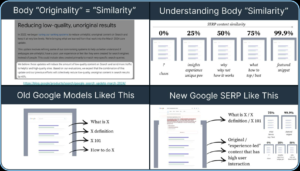Google’s recent March Core update states that they are reducing “low-quality, unoriginal content in search results by 40%”.
What does Google actually mean here? Some believe Google is implying “plagiarized” content.
Others believe Google is implying AI content.
After some investigations and research, Bernard Huang thinks that originality is penalizing queries that see a lot of SERP Content “Similarity” and Google’s imminent release of SGE.
This is why Google isn’t decreasing originality by 100%.
Here’s what is happening:
- Topics have varying degrees of SERP similarity.
- Featured Snippets are produced when almost all content agrees on the answer
- Legacy Google algorithm focused on serving content from authority site that focused on answering standard questions
- What’s AI and LLMs (and SGE) good at answering?
Questions where there’s already a high amount of information similarity
- Does it surprise you that Helpful Content Update decimated a bunch of content that looked similar?
- If the new Google model has an SGE sitting on top of the SERPs, and the goal of that SGE is to answer the highly agreed upon questions…. what’s the future of Google need to look like to stay useful?
- First-hand, experience-rich content.
Yes, that’s why you saw a rise of discussion boards like Reddit and Quora.
Yes, that’s also why Google inked a deal to capture that
- Manual Search Evaluators with updated Page Quality Ratings to include “Experience” because SGE / AI expected to cannibalize a ton of “similar” content queries
- So what’s one to do about it?
— Create Engaging, Experience-rich, and Entertaining Content
— Build a brand that’s searchers trust in the industry / space
— Prioritize content strategy that offers new perspectives
Agree, disagree? Open to thoughts here as I’m still workshopping this theory!
